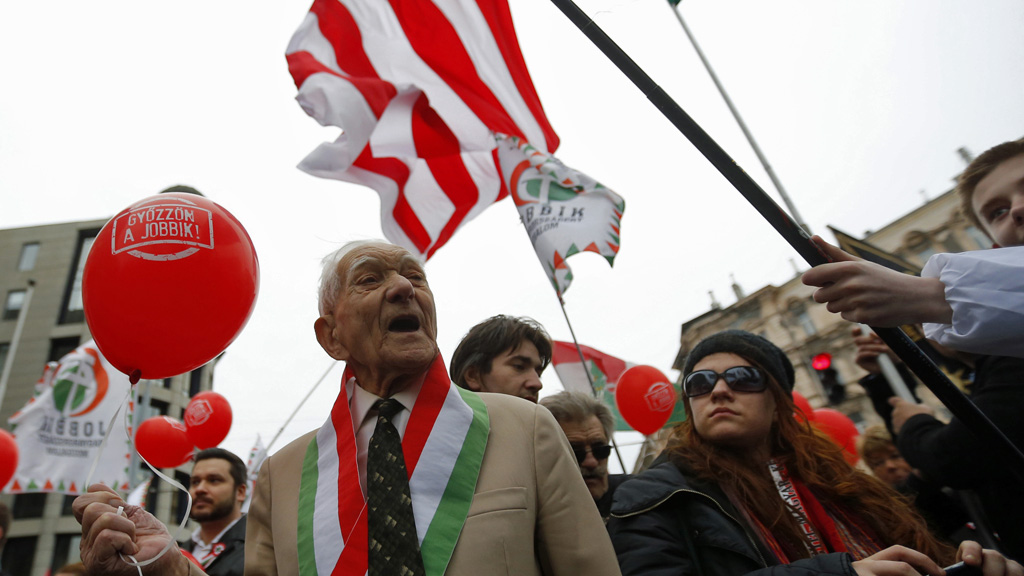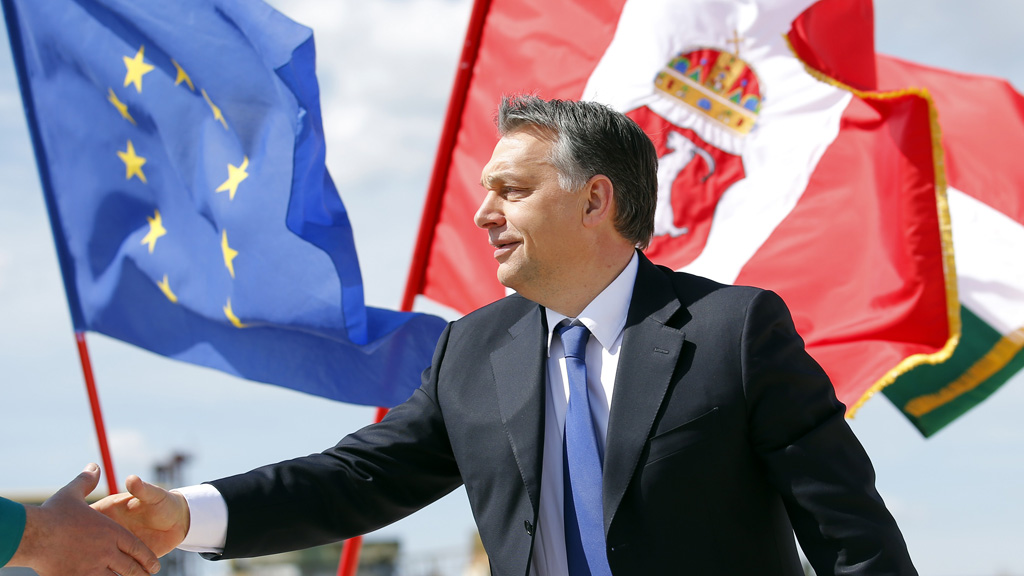Jobbik set for poll boost as Hungary moves to the right
Hungarians go to the polls on Sunday – and four years after the far-right Jobbik made its big electoral breakthrough, it seems the party is in a stronger position than ever, writes Brian Whelan.

Launching its 2014 election campaign Jobbik, long accused of anti-Semitism, chose a former synagogue in Esztergom. The move provoked protests from Hungary’s Jewish community, coming against the backdrop of the 70th anniversary of the Holocaust.
Last year Channel 4 News travelled to Budapest, where the World Jewish Congress was holding its annual meeting, in a bid to highlight the controversial right-wing party. Jobbik hosted a rally close to the hotel hosting the conference, with uniformed nationalist militias lining the street to hear MP Marton Gyongyosi speak.
Gyongyosi had issued a controversial call for a list of Jews who pose a “national security risk” to be produced in 2010. He later claimed he was misunderstood and had been referring only to members of government who hold Israeli passports.
‘Extreme anti-Semites’
A poll released last week claimed that between 15 and 20 per cent of Hungarians could be considered to be “extreme anti-Semites”, and up to one third of the population hold prejudices against the Jewish community.
It went on to claim that as many as 19 per cent of Hungarians are engaged in Holocuaust denial.
The figures emerged as the Federation of Hungarian Jewish Communities boycotted the Holocaust memorial celebrations, saying the plight of Hungary‘s Jews was being minimised.
The experts said radical parties were often one-hit wonders. Jobbik proved it was a stable, long-term participant in Hungarian politics. Gabor Vona, Jobbik leader
Despite Jobbik’s seemingly constant courting of controversy, the party is polling above 15 per cent. In 2010 it won 16.67 per cent of the vote and took 47 seats in parliament – as the third largest party.
Speaking last month, the party’s leader, Gabor Vona, mocked his party’s critics. “When we got into parliament in 2010, the experts said radical parties were often one-hit wonders. Jobbik proved it was a stable, long-term participant in Hungarian politics.”
Read more: on the streets with Hungary's far right
Third-largest party
The party has been accused of whipping up hatred against the Roma community, with leading Jobbik politicians attending marches alongside paramilitary style groups like the Magyar Garda through the heart of the Roma villages.
Mr Vona founded the Hungarian Guard paramilitary group in 2007 with the express purpose of targeting the Roma community.
A 2011 survey showed that as many as 60 per cent of Hungarians believed criminality was in “gypsy blood”, while another 40 per cent believed it should be legal to have segregated bars and clubs.
Against this backdrop of increased far-right vigilante actions against the Roma community, seven adults and two children have been killed in attacks since 2008 – though there is nothing to suggest a direct link between Jobbik and the murders.

Hungarian Prime Minister Viktor Orban at an election rally, 3 April 2014 (Reuters)
‘Extremist behaviour’
Jobbik began as the Right-Wing Youth Association in 2002, refounding as the Jobbik party in 2003 and entering an electoral pact with the far-right Justice and Life party.
It won three European parliament seats in 2009, shocking opponents, who claimed it was a one-off victory that it could not sustain.
It lost its long-time member and MEP Csanad Szegedi in 2012 when he discovered he had Jewish roots. He is now a practising Jew who attends synagogue.
In 1848 it was the Rothschilds and now it’s the International Monetary Fund. Hungarian independence compromises the Rothschilds’ interests. Janos Hargital, Fidesz MP
Internationally, Jobbik’s foreign policy places heavy emphasis on ethnic Hungarians living in neighbouring countries: Romania, Serbia, Ukraine, Slovakia and Austria.
Romania banned the party from entering the country last month, citing the “extremist behaviour” of Jobbik-aligned militias planning rallies in the country.
The party has backed Russia’s President Putin over Ukraine, breaking with its far-right comrades in Svoboda, who have taken seats in the new Kiev government. Jobbik wants to see ethnic Hungarians in Ukraine granted autonomy along with Crimea.
Pull to the right
As many as 900,000 votes are thought to remain undecided ahead of Sunday’s election, but Prime Minister Viktor Orban (pictured above) is expected to win another term.
His Fidesz party has felt the pull to the right in recent years, competing and co-operating with Jobbik’s nationalist populism.
Adopting the rhetoric of the hard right last month at a rally, Fidesz MP Janos Hargitai declared: “In 1848, it was the Rothschilds and now it’s the International Monetary Fund. Hungarian independence compromises the Rothschilds’ interests.”
Statues to Miklos Horthy have begun to spring up across Hungary in recent years, dedicated to the man behind the mass deportation of 400,000 Hungarian Jews in 1944 as head of state.
A small anti-Jobbik protest on Thursday drew a crowd of less than 100. One protester who travelled all the way from Poland said: “I was a member of Solidarity, I won’t stand by and see fascism happen in Europe again.
“That’s why we have come here to support Hungarian people.”
-
Latest news
-
Taylor Swift’s new break-up album breaks records3m

-
NHS trust fined £200K for failings that led to death of two mental health patients3m

-
Sunak vows to end UK ‘sick note culture’ with benefit reform3m

-
‘Loose talk about using nuclear weapons is irresponsible and unacceptable’, says head of UN’s nuclear watchdog3m

-
‘There wasn’t an Israeli attack on Iran,’ says former adviser to Iran’s nuclear negotiations team7m

-




